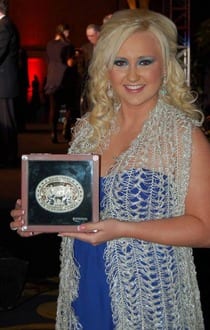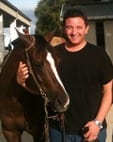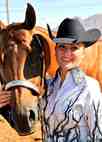When my parents first explored the idea of “home schooling” for me 10+ years ago, my mother took a lot of flak for the idea – mostly from my Dad! My Dad was shocked that my Mother would consider such a radical alternative to the traditional parochial school education that I was enjoying at the time. My Dad had been educated for years in private school, and felt that it was the option for me.
Although we had always planned that I would haul for Rookie of the Year in 2003, little attention had been given to the number of days that I would potentially miss by staying on the road showing. The solution my mother came up with was to home school me. As a longtime university professor, she was surely equipped to “teach” me, but it stirred a family debate that created a HUGE crisis at the time. For any of you who know how “passionate” my parents are when they get something in their brains, magnify that times 1000 and that is what is was like in our home as the homeschooling debate brewed for nearly a year.
As recently as the 1990’s, homeschooling families were sometimes unfairly branded as “pariahs” (outcasts). I didn’t know what pariah meant at the time, but I learned the definition quickly as concerned extended family members jumped into the discussion and made that reference. The notion of homeschooling was still not widely accepted in those days. Many of you may be shocked to learn that my Dad’s biggest argument against homeschooling was actually that it would cause me to lack socialization. Although hindsight is 20/20, little did he know that my unofficial major would turn out to be “socialite” – LOL! In the end, my parents did compromise, and agreed to a one year trial period of homeschooling before my Dad agreed to make the investment in a Rookie horse. If we flunked the course – I was back at St. Andrew – and horseless.
Since the concept of “failure” was not in my Mom’s master plan, we did persevere through that first year of home schooling, and never looked back. Actually, after six months of successful home schooling through a parochial based textbook program, my Dad looked around and said “Gee, why didn’t I think about this sooner?” A typical day for me in traditional school was on the bus as 6:00 a.m. and home at 4:00 p.m. With home schooling, my time investment was cut in more than half as there is no travel, no breaks between classes, no meal break, etc. I also quickly learned the value of time management since the harder I worked in school, the sooner I could get to the barn.
 When I began homeschooling, I was pretty much the “pioneer” for this teaching method in the horse industry. Several years after I took the leap, my mother made the acquaintance of Dr. Susan Hedgcock who had been the longtime Director of one of the most prestigious preparatory academies in Florida. Ironically, Dr. Hedgcock was also heavily involved in AQHA, with a son who happens to be a past AQHYA President! For my Mom, this relationship became a match made in heaven. Dr. “H” had educated some of the most famous young tennis and golf athletes in the world, and was sensitive to their travel schedules. For Dr. H, putting a horse show program together was a “no brainer.” It was also at that time that I made the leap from a “textbook” based program to a “computer” based program. I loved the visual interaction of the online format, and the immediate gratification it provided as far as assignment completion, and test grading.
When I began homeschooling, I was pretty much the “pioneer” for this teaching method in the horse industry. Several years after I took the leap, my mother made the acquaintance of Dr. Susan Hedgcock who had been the longtime Director of one of the most prestigious preparatory academies in Florida. Ironically, Dr. Hedgcock was also heavily involved in AQHA, with a son who happens to be a past AQHYA President! For my Mom, this relationship became a match made in heaven. Dr. “H” had educated some of the most famous young tennis and golf athletes in the world, and was sensitive to their travel schedules. For Dr. H, putting a horse show program together was a “no brainer.” It was also at that time that I made the leap from a “textbook” based program to a “computer” based program. I loved the visual interaction of the online format, and the immediate gratification it provided as far as assignment completion, and test grading.
As I recall, the second family to make the transition were the McMullen family from Tennessee. My Mom spoke to Mrs. McMullen “Carla” at great length at a show in Kentucky, and pretty soon, Lindsay was on board too. I can recall it was like opening the flood gates, and quickly Dr. H’s program became a virtual Who’s Who” of horse show kids. The proof is in the pudding. Armed with NCAA scholarships both Lindsey McMullen (Oklahoma State University) and Taylor Singmaster (South Carolina), the little experiment seems to be working for these families. In addition notable AQHA All-Around Champion, Kara Oldford is enjoying success at Stetson University.
 It is important to emphasize that different programs work for different families, so if you are considering this educational alternative it is important to assess your needs and see how the different types of schooling weigh in:
It is important to emphasize that different programs work for different families, so if you are considering this educational alternative it is important to assess your needs and see how the different types of schooling weigh in:
Traditional home schooling: The practice of educating a child in the home rather than sending them to an educational institution. Parents are often the person directly responsible for this education. Often textbook based.
Virtual school: Educational facilities that are not a physical location, but internet based. Instruction is provided online, and tests and papers are submitted online.
In both a virtual and traditional home school situation, often times there are a lack of physical interaction between an outside teaching staff and students. From this perspective, the Emerson Academy experience has been unique for me as I have access to one on one teaching by telephone, email, or in person as Dr. Hedgcock attends many of the major horseshows for both academic assistance, and counseling. In addition, Emerson offers face to face tutoring for traditional brick and mortar students while they are on the road for an extended period of time for a major show such as the Florida Gold Coast. As I prepare to graduate with what I feel is an amazing education, I also have the opportunity to attend a physical commencement which will be held at Disney World, and a formal prom in beautiful Bradenton, Florida.
Is Home Schooling right for your family? GoHorseShow.com recently interviewed a number of horse show enthusiasts who are in alternative education programs, and here are the highlights of what they had to say:
 Parris Rice: Parris is a student of Insight School of Washington which is actually considered a public school and is run through the Quileute School District. An interesting fact is that it is actually the school district used in my all-time favorite movie, Twilight! How cool is that? The online program has approximately 3,000 students across the state of Washington, and is set up the same as a regular school where you have due dates, separate teachers for all your classes and you can interact with the other students. For Parris, the benefit is that it is more flexible than a regular school as it was created for students like herself who had trouble with the time commitment to a regular school.
Parris Rice: Parris is a student of Insight School of Washington which is actually considered a public school and is run through the Quileute School District. An interesting fact is that it is actually the school district used in my all-time favorite movie, Twilight! How cool is that? The online program has approximately 3,000 students across the state of Washington, and is set up the same as a regular school where you have due dates, separate teachers for all your classes and you can interact with the other students. For Parris, the benefit is that it is more flexible than a regular school as it was created for students like herself who had trouble with the time commitment to a regular school.
Advantages: freedom to shape your day how you like. Disadvantages: Missing out on the high school experiences. I was lucky with the fact that because of my friends at my old high school I was still able to go to Tolo and Homecoming. But not everybody gets this opportunity so you have to be prepared for the possibility of giving up the experiences that come with high school. Career Highlights: Parris describes that showing horses has actually helped her with school. “Without showing I wouldn’t be going to Baylor University”. She credits the extra riding time afforded as helping her have an advantage in winning her first world championship in 2009!
 Kara Oldford: “My public school was very tough on attendance,” Kara said. “At the conclusion of my freshman year of high school, the school board actually “failed” me due to absences. We had to jump through hoops to get my credits back. Eventually, the Vice Principal started talking to my teachers if they would give me trouble, but it was still a constant battle. During my junior year I got my horse, Travis, and it was time to make a change so I could spend the necessary time to bond with him. At that time my parents and I decided it was necessary to complete my education through an online school and joined Dr. H at Bradenton Academy (now affiliated with Emerson Academy).”
Kara Oldford: “My public school was very tough on attendance,” Kara said. “At the conclusion of my freshman year of high school, the school board actually “failed” me due to absences. We had to jump through hoops to get my credits back. Eventually, the Vice Principal started talking to my teachers if they would give me trouble, but it was still a constant battle. During my junior year I got my horse, Travis, and it was time to make a change so I could spend the necessary time to bond with him. At that time my parents and I decided it was necessary to complete my education through an online school and joined Dr. H at Bradenton Academy (now affiliated with Emerson Academy).”
Now at Stetson University, Kara states “I remember getting to college and kids were going crazy with their newfound “freedom”. After enjoying homeschooling, Kara actually felt like she had lost her freedom! Self described as a “very goal oriented and driven person by nature”, Kara has adjusted by once again juggling both showing and school again.
Advantages: The main advantage was the freedom to work as quickly as I wanted and still have the ability to take time off when necessary Kara enjoyed having access to “real” teachers. Like myself, she also enjoyed the freedom of taking one class at a time and completing it before moving on. It is sometimes easier to retail information and stay on track. Disadvantages: If I spent too much time at home, I would get very bored. You can work on school for a few hours a day, but after that you start to miss the socialization. My art class helped with that aspect, but I still wasn’t quite as connected with my old friends because I was missing too much from the normal day at school.Career Highlights: AQHYA All-Around Youth, Congress and World Champion
 Jonathan Nowacki: Jonathan was very honest about his experience with home schooling. As a student of Florida Virtual School, FVS, he was candid that at times it was hard to stay focused due to not have a structured schedule like you do in regular school, and found that enlisting the help of tutors was beneficial. Jonathan decided to be homeschooled his first year in high school because there really wasn’t any other way to be able to show on a national level while being in regular school.
Jonathan Nowacki: Jonathan was very honest about his experience with home schooling. As a student of Florida Virtual School, FVS, he was candid that at times it was hard to stay focused due to not have a structured schedule like you do in regular school, and found that enlisting the help of tutors was beneficial. Jonathan decided to be homeschooled his first year in high school because there really wasn’t any other way to be able to show on a national level while being in regular school.
Advantages: I love the fact that I was able to travel and go around the country showing, Disadvantages: It was hard to leave all my friends behind, and it was hard to do homework when I really wanted to go ride! Career Highlights: NSBA World Champion and Congress Champion
 Lindsey McMullen: After three years in a virtual program starting in grade 8, Lindsay found that she preferred to have actual books in front of her so she could have something to hold and flip through. The curriculum at Abeka Academy was well suited to the needs of this notable equestrian. Each nine weeks, Lindsay received work and DVDs to watch of actual class time. “People always ask if I missed all the social stuff like football games and prom, and honestly, the horses and riding just meant so much more that I never feel like I missed out. I went through a short stage in early high school that I missed my friends and felt like I didn’t have any friends anymore, but the more friends I made in the horse world and the more we traveled those feelings faded away quickly!” She states unequivocally that she wouldn’t have it “any other way”.
Lindsey McMullen: After three years in a virtual program starting in grade 8, Lindsay found that she preferred to have actual books in front of her so she could have something to hold and flip through. The curriculum at Abeka Academy was well suited to the needs of this notable equestrian. Each nine weeks, Lindsay received work and DVDs to watch of actual class time. “People always ask if I missed all the social stuff like football games and prom, and honestly, the horses and riding just meant so much more that I never feel like I missed out. I went through a short stage in early high school that I missed my friends and felt like I didn’t have any friends anymore, but the more friends I made in the horse world and the more we traveled those feelings faded away quickly!” She states unequivocally that she wouldn’t have it “any other way”.
Advantages: Stating that “the advantages of homeschooling are too many to list”, Lindsey enjoyed spending more time with the horses, which is “what it is all about”. Also, it worked well for her family who keeps horses at home, including broodmares and babies which is “almost enough work to keep us at the barn all day long!” Disadvantages: Lindsey notes that for some it can be the social part. “I know I’ve stressed that I didn’t miss all of that stuff. I was brought into the home school world later in my life, but for some kids that have been doing it all their life can lack some social skills that kids can only achieve by going to school with other kids. I think it’s best to go to school for a little while, develop those skills, then venture into homeschooling.” Career Highlight: NCAA Scholarship – Oklahoma State University!
 Danielle Long: Although she referenced that there was a lot of drama involved, Danielle felt having teachers help in Service High School made the curriculum easier. She points out that homeschooling is not for everyone, and knows some people who tried it but it didn’t work out the way they planned. She does cite that it can be harder to stay focused without a structured schedule like regular school, and that it can become easy to procrastinate. Her reply to any of the critics that would imply that horse showing was more important than her education? Education is number 1 in my family. Horse showing is a privilege.
Danielle Long: Although she referenced that there was a lot of drama involved, Danielle felt having teachers help in Service High School made the curriculum easier. She points out that homeschooling is not for everyone, and knows some people who tried it but it didn’t work out the way they planned. She does cite that it can be harder to stay focused without a structured schedule like regular school, and that it can become easy to procrastinate. Her reply to any of the critics that would imply that horse showing was more important than her education? Education is number 1 in my family. Horse showing is a privilege.
Advantages: Advantages of homeschooling are I never miss a day of class, learn at my own pace, and can create a schedule around the horses. Disadvantages: Getting into “school mode” – at home it’s easy to procrastinate. Career Highlights: World Champion
 Cydney Benes: Last, but not least, my little sidekick and diva in training, Cydney Benes also happens to be the daughter of my uber-fabulous sponsor, All That Show Clothing owner, Tammy Schuster-Benes. Following in my footsteps, Florida native Cydney is also a student at Emerson Academy. With aspirations of becoming a vet, or fashion designer, Cydney takes her involvement in equestrian sports very seriously, and considers herself a student athlete just like golfers, and tennis players. Cydney states that horseshows are part of my education and learning experience. As a regular employee in her mother’s awesome boutique, she enjoys success both in and out of the arena. Spoken like a true champ, Cydney points out that she prefers Emerson’s curriculum to traditional school because it is more challenging. Way to go Cyd!
Cydney Benes: Last, but not least, my little sidekick and diva in training, Cydney Benes also happens to be the daughter of my uber-fabulous sponsor, All That Show Clothing owner, Tammy Schuster-Benes. Following in my footsteps, Florida native Cydney is also a student at Emerson Academy. With aspirations of becoming a vet, or fashion designer, Cydney takes her involvement in equestrian sports very seriously, and considers herself a student athlete just like golfers, and tennis players. Cydney states that horseshows are part of my education and learning experience. As a regular employee in her mother’s awesome boutique, she enjoys success both in and out of the arena. Spoken like a true champ, Cydney points out that she prefers Emerson’s curriculum to traditional school because it is more challenging. Way to go Cyd!
Advantages: I definitely like it better than regular school as it allows me to compete at more horse shows and train harder while being able to grow up in the family business! Disadvantages: NONE! Career Highlights: Congress Champion
Homeschooling is definitely a major decision that should be reached as a family. I credit the challenging curriculum to much of my success both in and outside of the horseshow arena, including my AQHYA and NSBA Youth Presidencies, and my glamorous job at GoHorseShow.com! At 18, I still pinch myself when I think about all of the blessings that home schooling, Dr. Hedgcock, and Emerson have provided. Without the freedom and flexibility this lifestyle has afforded, my lifestyle would not have been nearly so much fun and interesting! To any perspective families with questions about homeschooling, please feel free to contact me directly and I will be happy to share my personal experience with you! On a private note to Dr. Susan Hedgcock (who you can locate on Facebook), is there any possibility that I can get a pink cap and gown for commencement? It’s so Elle Woods, and Dakota Diamond.








